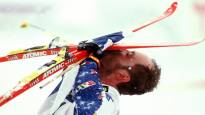In extreme circumstances, the competition format can be changed, but the rule seems to be a dead letter. Jessica Diggins, who was pushed to become a snow plough, fared better than Mika Myllylä in 1999, writes Pekka Holopainen.
Pekka Holopainen sports reporter
Peter Petrice too ears rang red on February 23, 1999 in Ramsau, Austria. The same competition format, the pursuit, as on Thursday in Davos was about to begin, albeit with free technique and significantly larger stakes.
The same thing was that the snow was falling from the sky and the athlete who had put his neck in the chase was about to find himself in an unreasonable situation as a snow plow.
The Slovenian chairman of the refereeing council of the World Cup now listened to Finland’s head coach Kari-Pekka Kyrön a very loud plea to change the race format to a split start, which would have saved the day Mika Myllylän from having to plow through fresh, wet, sticky snow. Nothing more or less rested on the table than the Haapajärvi man’s third gold medal in the respective World Championships.
Petricek described Kyrö’s speech as “non-diplomatic” to the signatory the next day. The silver medal was already hanging around Myllylä’s neck. The Norwegian started almost a minute behind Thomas Alsgaard had claimed the World Championship gold. Myllylä was unarmed, when the strongest cannon of his time and the most skilled peesaer passed by at the end.
For deaf ears
Kyrön and sport director Antti Leppävuoren a plea that relied entirely on the rulebook had fallen on deaf ears. If the message had gone through, Myllylä would have won no less than four World Championship golds in Ramsau. The Finnish duo appealed to the fact that if extreme weather conditions hit the pursuit competition, the judges’ council, or jury, can change the competition format.
In 1999, the alternative would have been an intermediate start, on Thursday in Davos either a mass start or an intermediate start. The latter possibility is effectively ruled out by something as simple as the event’s international TV slot.
Acquired a brisk lead with great effort in previous stages Jessica Diggins were put in a desperate position to ski the snow-covered ruts. If, even in this kind of weather, changing the competition format to make it fairer for the top was not considered, the rule will hang in the ranks of the International Ski Federation as a mostly dead letter.
Put in a hopeless seam, Diggins lost his lead and was in big trouble at times in the 20km race (p), but dodged the bullet thanks to his iron physique, intelligence and experience. There were ingredients for a judicial murder, but it was not experienced.
Fairness and top sport
On the other hand.
Jury man Petricek was not the only one whom Kyrö talked to in Ramsau 1999. The head coach was very surprised that he signed an article related to the pursuit competition at that time, in which I praised the entertainment values of the competition – despite the fact that Myllylä suffered an injustice.
Fairness and elite sports basically do not fit in the same sentence, it’s good if they are in the same dictionary. It had Kerttu My neck won by the women’s pursuit, with all its stages and ski variations, a very entertaining race.
And when a total of seven races are held in three locations prone to extreme meteorological phenomena, it can be assumed that there will be a variety of weather conditions.
A Finnish technical expert who has worked at many international value events summed it up like this:
– After all, it (heavy snowfall) only adds interest, and the tension increases towards the end, when the differences get smaller. More headlines and drama.
At least there was drama In the German team. The cross country boss of the country Peter Schlickenrieder lost his Tour de Ski accreditation after placing a crosswise ski on the track, on which his own women were able to dislodge the snow blocks frozen against the grip creams.
One of the fathers of the now-banned genius label is considered Kari-Pekka Kyröä. At the 1995 World Championships in Thunder Bay, skis slowed down by dirty snow were skied over rags soaked in fuel. Kyrö, the young coach of the women’s national team, visited Ontario to buy rags and fuel.
